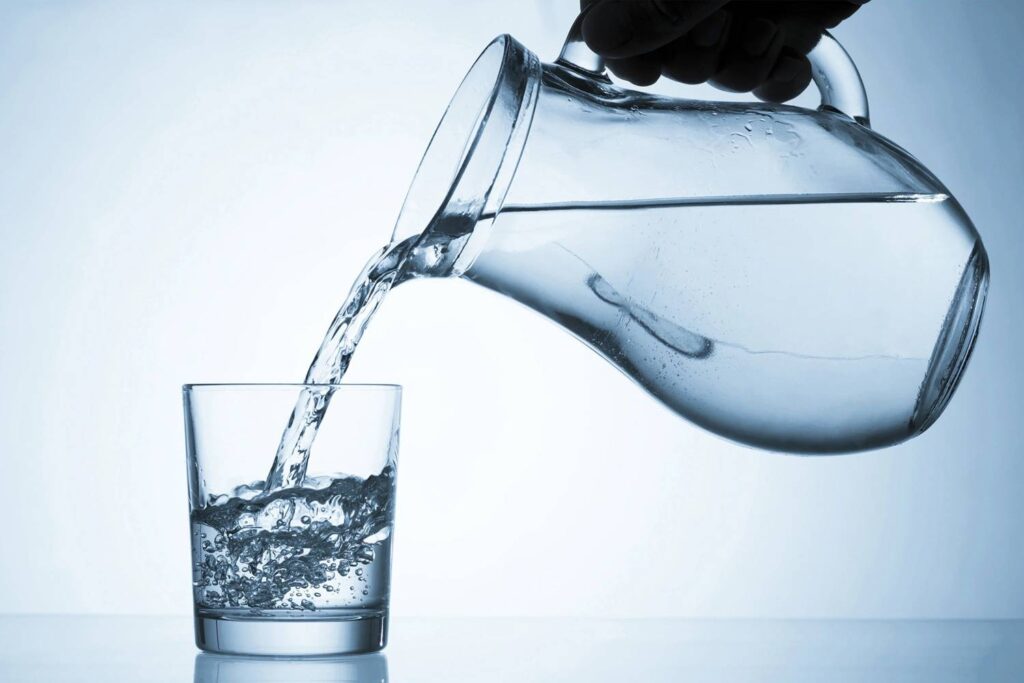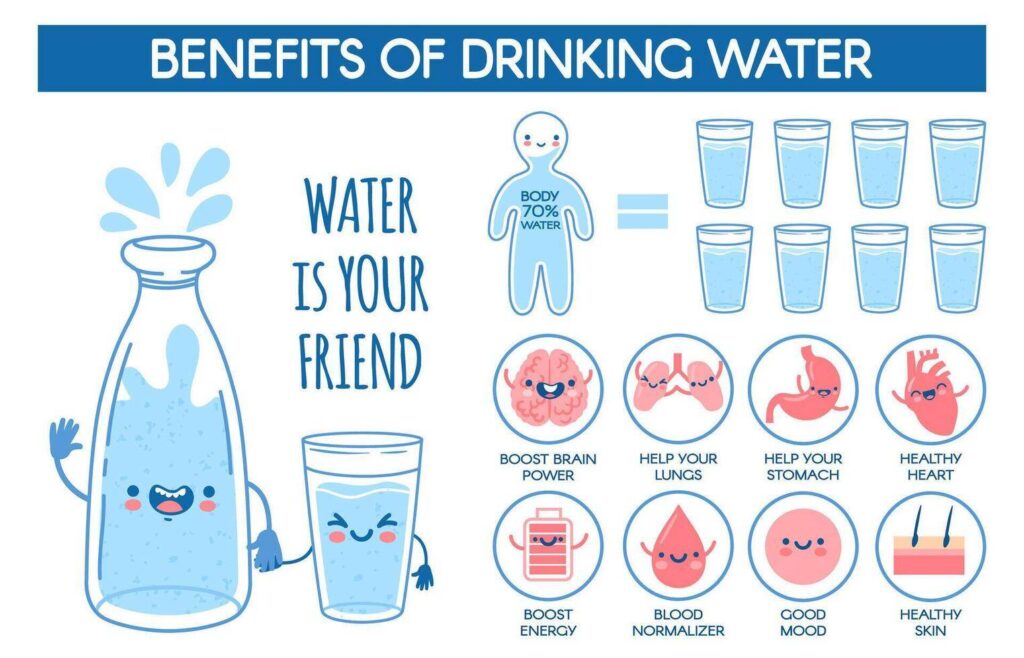Water is the essence of life. Every cell, tissue, and organ in your body depends on adequate hydration to function properly. While thirst is a clear indicator that your body needs water, there are several less obvious signs that suggest dehydration. Ignoring these signals can lead to fatigue, impaired cognitive function, and even chronic health issues.

Introduction – The Importance of Hydration for Overall Health
Hydration is more than just drinking water when you feel thirsty. Your body constantly loses water through sweat, urine, and even breathing. If you fail to replenish it adequately, dehydration can slowly set in. Recognizing these hidden signs of dehydration early can prevent long-term health complications.
How Dehydration Affects Your Body
Hydration plays a crucial role in regulating body temperature, maintaining electrolyte balance, and ensuring smooth digestion. When your body lacks adequate water, it begins to show signs that go beyond simply feeling thirsty. Recognizing these symptoms early can help prevent complications and restore proper hydration levels before dehydration worsens.
Even mild dehydration can affect organ function, slow down metabolism, and cause imbalances in the body. Since water makes up about 60% of the human body, any drop in hydration levels can quickly impact physical and mental performance.
Unexpected Signs of Dehydration
Dry Skin and Premature Aging
Your skin is the largest organ in your body, and it requires constant hydration to stay healthy. If you notice your skin feeling unusually dry, flaky, or less elastic, it may be due to a lack of sufficient water intake. Over time, chronic dehydration can accelerate the aging process, making fine lines and wrinkles more prominent.
How Hydration Impacts Skin Health
When your body is adequately hydrated, your skin appears plump and radiant. Dehydration, however, can lead to dullness and increased sensitivity. Drinking enough water supports collagen production, which is essential for maintaining youthful skin.
Additionally, dehydrated skin is more prone to irritation and breakouts. Without enough water, the skin’s natural barrier weakens, making it susceptible to environmental damage. Using moisturizers can help, but internal hydration is the key to long-term skin health.
Persistent Fatigue and Brain Fog
Have you ever felt mentally exhausted even after a full night’s sleep? Dehydration can impair cognitive function, leading to brain fog, difficulty concentrating, and persistent fatigue. Water is essential for transporting nutrients and oxygen to the brain, and even mild dehydration can negatively affect mood and mental performance.
The Science Behind Hydration and Cognitive Function
Studies show that even a 1–2% loss of body water can significantly impair cognitive abilities, including memory retention and decision-making skills. Keeping yourself hydrated throughout the day ensures that your brain operates at its full potential.
Since the brain is composed of about 75% water, dehydration can lead to decreased neurotransmitter activity. This affects mental clarity, leading to slower reaction times and reduced problem-solving abilities. Drinking enough water keeps your brain sharp and energy levels steady.
Frequent Headaches and Dizziness
Headaches are one of the most common yet overlooked signs of dehydration. When your body lacks water, blood volume decreases, leading to reduced oxygen flow to the brain. This can trigger headaches and even cause dizziness in severe cases.
How to Differentiate Between Dehydration and Other Causes
If you experience frequent headaches, try increasing your water intake before reaching for pain relievers. Often, dehydration-induced headaches improve within 30 minutes of drinking water.
Additionally, dizziness may occur when dehydration lowers blood pressure. Without adequate hydration, your body struggles to circulate blood efficiently, making you feel lightheaded when standing up quickly.
Muscle Cramps and Joint Pain
Dehydration affects muscles and joints by reducing lubrication and electrolyte balance. When your body lacks water, muscles become more prone to cramping, and joints may feel stiff or painful.
The Role of Electrolytes in Muscle Function
Water helps transport essential minerals such as sodium, potassium, and magnesium, which are crucial for muscle function. Without proper hydration, electrolyte imbalances can lead to painful muscle contractions and decreased flexibility.
If you frequently experience muscle cramps, especially after physical activity, it may be a sign that your body needs more hydration. Drinking water with added electrolytes can help maintain muscle performance and prevent cramping.
Digestive Issues and Constipation
Water plays a critical role in digestion. It helps break down food, supports nutrient absorption, and keeps the digestive tract running smoothly. When you are dehydrated, your body pulls water from the colon, leading to constipation.
Why Hydration is Essential for Gut Health
Proper hydration keeps stool soft and easy to pass. Without enough water, digestion slows down, causing bloating, discomfort, and difficulty eliminating waste.
In addition to drinking enough water, eating fiber-rich foods can help maintain digestive health. However, fiber needs water to work effectively, so increasing fiber intake without proper hydration may worsen constipation.
Dark Urine and Reduced Urination
One of the simplest ways to check hydration levels is by observing urine color. When you are well-hydrated, urine is pale yellow and odorless. Dark yellow or amber-colored urine often signals dehydration.
The Connection Between Hydration and Kidney Function
Your kidneys filter waste and toxins from the body, but they require adequate water to function efficiently. When dehydrated, the body conserves water, leading to concentrated urine and reduced urination frequency.
Chronic dehydration can put extra strain on the kidneys, increasing the risk of kidney stones and urinary tract infections. Drinking enough water supports kidney health and helps flush out toxins.
Bad Breath and Dry Mouth
Saliva contains antibacterial properties that help prevent bad breath. However, dehydration reduces saliva production, allowing bacteria to thrive in the mouth. This can lead to persistent bad breath and a dry, sticky feeling in the mouth.
How Hydration Supports Oral Health
Drinking water helps wash away food particles and bacteria, keeping the mouth clean and fresh. Staying hydrated also prevents dry mouth, which can contribute to tooth decay and gum disease.
Chewing sugar-free gum or eating hydrating foods like cucumbers and watermelon can provide temporary relief, but drinking enough water remains the best long-term solution.
Increased Heart Rate and Palpitations
When the body lacks water, blood volume decreases, making the heart work harder to circulate blood. This can lead to an increased heart rate and occasional palpitations.
Why Hydration is Vital for Cardiovascular Health
Dehydration causes the blood to become thicker, increasing the risk of high blood pressure and poor circulation. Proper hydration helps maintain a steady heart rate and prevents unnecessary strain on the cardiovascular system.
If you notice an irregular heartbeat after exercise or prolonged heat exposure, rehydrating immediately can help stabilize your heart rate.
Hydration is essential for overall health, yet many people fail to recognize the subtle signs of dehydration. Dry skin, fatigue, headaches, digestive issues, and even heart palpitations can all indicate that your body needs more water.
Listening to these early warning signs and adjusting your water intake accordingly can prevent long-term health problems. Aim to drink enough water daily, eat hydrating foods, and pay attention to how your body responds. By staying hydrated, you can improve energy levels, mental clarity, and overall well-being.
Physical and Emotional Signs That Indicate Dehydration
Water is essential for every function in your body. It regulates temperature, aids digestion, transports nutrients, and keeps your skin, muscles, and organs functioning smoothly. However, dehydration can sneak up on you before you even feel thirsty. Beyond thirst, your body sends multiple physical and emotional signals when it lacks proper hydration. Recognizing these warning signs early can help prevent long-term health complications.
Physical Signs That Indicate Dehydration
Dark-Colored Urine and Reduced Frequency
Urine color is a simple yet effective indicator of hydration levels. Light yellow or clear urine suggests adequate hydration, while dark yellow or amber-colored urine signals dehydration. The reason is that when the body lacks sufficient water, the kidneys retain fluids, leading to more concentrated urine.
Infrequent urination is another key sign of dehydration. If you notice fewer trips to the bathroom, your body may be conserving water due to inadequate intake. A healthy adult typically urinates between six to eight times a day. If you’re urinating less frequently or your urine is darker than usual, increasing your water intake can help restore balance.
Besides monitoring urine color, pay attention to any strong odors. Dehydration can lead to a more pungent smell due to concentrated waste products in the urine. Proper hydration helps flush out toxins and maintain a healthy urinary system.
Dry Mouth and Bad Breath
Saliva helps cleanse the mouth and maintain a balanced environment by washing away bacteria. However, when you’re dehydrated, saliva production decreases. This results in a dry, sticky feeling in the mouth and an increased risk of bad breath.
Bacteria thrive in a dry mouth, contributing to unpleasant odors. Hydration ensures that saliva effectively neutralizes bacteria and prevents the buildup of food particles that cause bad breath. If you experience persistent dry mouth, it may be a sign that your body is lacking water.
Drinking plenty of water not only improves oral health but also keeps your throat lubricated. In addition to water, eating hydrating foods like cucumbers, oranges, and watermelon can help maintain adequate moisture levels in the mouth.
Muscle Cramps and Joint Pain
Water plays a crucial role in maintaining electrolyte balance and muscle function. Dehydration can lead to painful muscle cramps, stiffness, and joint discomfort due to the loss of essential minerals like potassium, sodium, and magnesium. These minerals help regulate muscle contractions, and without enough water, muscles may become more prone to spasms.
How Hydration Supports Muscle Function
When you sweat, your body loses both water and electrolytes. This is especially common during physical activity or exposure to hot weather. Without adequate hydration, muscles struggle to contract and relax properly, leading to cramps and reduced flexibility.
Joints also rely on hydration to stay lubricated. The cartilage in joints contains a high percentage of water, which helps cushion bones and prevent friction. When hydration levels drop, joint stiffness and discomfort can become more noticeable. Drinking water consistently throughout the day supports overall mobility and reduces the risk of cramps and joint pain.

Behavioral and Emotional Indicators of Dehydration
Mood Swings and Increased Irritability
Dehydration doesn’t just affect your body—it also impacts your brain and mood. Studies have shown that even mild dehydration can lead to increased stress, irritability, and anxiety. This happens because water is essential for neurotransmitter function and hormone regulation. When hydration levels drop, the brain struggles to maintain emotional balance.
Without enough water, the production of serotonin, the “feel-good” neurotransmitter, may decrease. This can lead to mood swings, frustration, and heightened sensitivity to stress. Additionally, dehydration can make you feel more tired, which may further contribute to irritability.
Staying hydrated helps maintain mental clarity, reduces stress, and supports overall emotional well-being. If you’re feeling unusually anxious or on edge, consider drinking a glass of water and seeing if your mood improves.
Increased Sugar Cravings
Feeling unusually hungry, especially for sweets, might be your body’s way of signaling dehydration. The liver plays a key role in energy production, relying on water to release stored glycogen for fuel. When dehydration sets in, the liver struggles to perform this function efficiently, leading to sudden cravings for quick-energy foods like sugar and processed snacks.
How to Differentiate Between Hunger and Dehydration
Hunger and dehydration can feel similar, making it easy to mistake one for the other. Before reaching for a sugary snack, try drinking a glass of water and waiting a few minutes. If the cravings subside, dehydration was likely the cause rather than actual hunger.
This trick works because dehydration often leads to low energy levels. Your body craves sugar as a quick fix, but what it truly needs is hydration. Drinking water before meals can also help prevent overeating by ensuring that thirst isn’t mistaken for hunger.
Tips for Staying Hydrated
Water is essential for life. Every organ, cell, and tissue in your body depends on proper hydration to function at its best. Yet, many people overlook the importance of consistent water intake, often waiting until they feel thirsty to drink. By the time thirst kicks in, dehydration may have already begun.
Staying hydrated isn’t just about drinking plain water—it’s about making hydration a part of your daily routine. Whether through setting goals, eating hydrating foods, or paying attention to your body’s signals, small adjustments can make a big difference. Here are practical and effective ways to maintain hydration throughout the day.
Set a Daily Water Intake Goal
The recommended daily water intake varies based on factors such as age, weight, activity level, and climate. While a general guideline is to drink at least eight 8-ounce glasses of water per day (also known as the “8×8 rule”), individual needs can differ.
People who exercise frequently, live in hot climates, or have higher metabolic rates may require more water to stay hydrated. A more personalized approach is to aim for half your body weight in ounces of water each day. For example, if you weigh 150 pounds, drinking about 75 ounces of water daily can help maintain hydration.
How to Track Your Water Intake
Setting a water intake goal is helpful, but tracking your progress ensures consistency. Here are a few easy ways to monitor how much water you drink:
- Use a water-tracking app – Apps like MyFitnessPal, Hydro Coach, or WaterMinder can send reminders and track daily consumption.
- Carry a reusable water bottle – Marking measurements on your bottle helps you visualize your progress.
- Set alarms or reminders – Scheduling hydration breaks can help develop the habit of drinking water regularly.
- Drink a glass of water with every meal – This simple habit ensures you get at least three extra glasses daily.
When you set a clear hydration goal, you’re more likely to stay consistent and meet your body’s water needs.
Incorporate Hydrating Foods
Drinking water isn’t the only way to stay hydrated. Many fruits and vegetables have high water content, providing extra hydration while delivering essential vitamins and minerals.
Best Hydrating Foods to Include in Your Diet
Eating water-rich foods can supplement your hydration efforts and keep your body nourished. Some of the best options include:
- Watermelon – Composed of about 92% water, this fruit is not only hydrating but also rich in antioxidants.
- Cucumbers – With a 96% water content, cucumbers are one of the most hydrating vegetables.
- Oranges – Juicy and refreshing, oranges contain about 86% water and provide a boost of vitamin C.
- Lettuce – Leafy greens like lettuce and spinach are over 90% water and support digestion and hydration.
- Strawberries – These sweet berries are about 91% water and packed with fiber and antioxidants.
- Zucchini – A versatile vegetable with 94% water content, making it a great addition to salads and stir-fries.
How to Include Hydrating Foods in Your Diet
Incorporating these foods into your daily meals is easy and delicious. Here are some simple ways to add more water-rich foods to your diet:
- Start your day with a smoothie using fruits like watermelon, strawberries, and oranges.
- Snack on cucumber slices or orange wedges instead of processed snacks.
- Add lettuce, zucchini, and tomatoes to salads, sandwiches, or wraps.
- Enjoy a bowl of fruit salad as a refreshing dessert or midday snack.
- Make homemade infused water with lemon, cucumber, and berries for added flavor.
By combining hydrating foods with regular water intake, you can maintain fluid balance without feeling like you’re forcing yourself to drink too much water.
Listen to Your Body’s Signals
Many people wait until they feel thirsty to drink water, but thirst is actually a late sign of dehydration. Instead of relying on thirst alone, make hydration a proactive habit.
Signs Your Body Needs More Water
Even mild dehydration can cause noticeable symptoms, such as:
- Dry lips and mouth – A lack of saliva can lead to discomfort and bad breath.
- Fatigue and dizziness – Dehydration reduces oxygen flow, making you feel weak or lightheaded.
- Headaches – Low water levels can cause headaches due to decreased blood flow to the brain.
- Dark-colored urine – Healthy urine should be light yellow. Dark urine suggests dehydration.
- Sugar cravings – The body sometimes mistakes dehydration for hunger, leading to cravings.
How to Stay Hydrated Throughout the Day
Rather than waiting until you’re extremely thirsty, build hydration into your daily routine:
- Keep a water bottle with you – Having water within reach makes it easier to sip throughout the day.
- Take small sips regularly – Instead of chugging large amounts at once, sip water in intervals.
- Drink a glass of water before meals – This not only improves hydration but may also prevent overeating.
- Hydrate before and after exercise – Replenishing fluids before and after workouts prevents dehydration.
- Choose water over sugary drinks – While sodas and juices contain liquid, they often lead to more dehydration due to sugar content.
By paying attention to how your body feels and responding before dehydration sets in, you can maintain energy, focus, and overall well-being.
Water is life’s matter and matrix, mother and medium. There is no life without water.
Albert Szent-Györgyi
Conclusion
Hydration is about more than just drinking water when you feel thirsty. Your body constantly loses fluids through sweat, breathing, and digestion, so staying hydrated requires consistent effort.
Setting a daily water intake goal ensures that you drink enough water based on your body’s needs. Eating hydrating foods like watermelon, cucumbers, and oranges provides extra hydration while delivering essential nutrients. Finally, listening to your body’s subtle signals and making hydration a regular habit can help prevent dehydration before it affects your energy, mood, or health.
By prioritizing hydration every day, you can improve your overall well-being, maintain optimal body function, and feel your best. Start small—carry a water bottle, eat more hydrating foods, and pay attention to how you feel. These simple changes can make a big difference in keeping your body hydrated and healthy.
